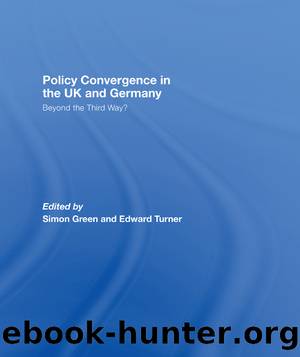Policy Convergence in the UK and Germany: Beyond the Third Way? by Simon Green

Author:Simon Green [Green, Simon]
Language: eng
Format: epub
Tags: Political Science, General, Social Science
ISBN: 9781138995031
Google: L4BCjwEACAAJ
Goodreads: 30153847
Publisher: Routledge
Published: 2016-01-31T12:13:41+00:00
Convergence and Non-Convergence in Policy Agendas and Responses
This, then, is the historical and topical background against which policy convergence can be considered. And, indeed, it is apparent that some convergence in policy goals, both domestic and European, as well as to some extent in actual policy instruments adopted, has taken place between the two countries, even though divergence persists in other areas. Without claiming to be exhaustive, especially with reference to EU initiatives, the following section draws on a range of examples from the domestic and supranational arenas to illustrate this argument. It is subdivided into three substantive areas, each of which illustrates increasing levels of convergence: labour and dependant migration, citizenship and integration policy, and asylum policy.
Labour and Dependant Migration
Initially, labour migration represented one of the core elements of the process of modernisation in immigration policy to which New Labour and the SPDâGreen governments aspired. Instead of maintaining their predecessorsâ ultimately undeliverable promises to prevent (non-ethnic) immigration altogether,53 the centre-left governments in the UK and Germany resolved instead to structure migration to the respective countriesâ advantage. This change in perspective coincided not only with demographic and skills issues returning to the fore, but also with the boom of the âNew Economyâ, with its seemingly insatiable demand for new ideas and skills in information technology. And it was this sector which proved to be the catalyst to new labour migration in both countries.54 In February 2000, Chancellor Schröder, to widespread acclaim from business leaders, announced the introduction of the so-called âGreen Cardâ scheme, under which up to 20,000 IT specialists would be allowed to work for up to five years in Germany. Despite its limited scope, this proposal helped redefine the terms of the debate, by emphasising for the first time in almost 30 years that new immigration could actually benefit Germany.55 This principle was carried forward in 2001 into the discussion over the form a possible comprehensive immigration law (Zuwanderungsgesetz), the first in Germanyâs history, might take. The so-called Süssmuth Commission, which was set up by Interior Minister Otto Schily to develop reform proposals, even suggested a points-based system to attract an annual quota of high-skilled migrants, plus additional migration in shortage sectors.56
In the end, though, the Commissionâs recommendations proved too radical a change in political terms. Faced with an electorate which remained deeply sceptical about immigration, not least in times of record unemployment, the opposition CDU/CSU dropped its initial support for the government. Ultimately, the new law, which did not come into force until 1 January 2005, failed to go beyond providing limited entry possibilities to individual high-skilled migrants from outside the EU. Tellingly, the Green Card programme itself proved not to be a great draw either: not even the initial, distinctly modest quota could be fulfilled.57 What is more, holders of Green Cards quickly came up against ingrained administrative patterns of implementation, which continued to view their very presence as undesirable.58 Yet, despite such setbacks, the issue of new labour migration remains very much on the political
Download
This site does not store any files on its server. We only index and link to content provided by other sites. Please contact the content providers to delete copyright contents if any and email us, we'll remove relevant links or contents immediately.
Spell It Out by David Crystal(36019)
Life for Me Ain't Been No Crystal Stair by Susan Sheehan(35718)
Cecilia; Or, Memoirs of an Heiress — Volume 1 by Fanny Burney(32411)
Cecilia; Or, Memoirs of an Heiress — Volume 3 by Fanny Burney(31818)
Cecilia; Or, Memoirs of an Heiress — Volume 2 by Fanny Burney(31794)
The Great Music City by Andrea Baker(31248)
Professional Troublemaker by Luvvie Ajayi Jones(29570)
We're Going to Need More Wine by Gabrielle Union(18950)
The Secret History by Donna Tartt(18803)
Twilight of the Idols With the Antichrist and Ecce Homo by Friedrich Nietzsche(18473)
All the Missing Girls by Megan Miranda(15484)
Cat's cradle by Kurt Vonnegut(15145)
Pimp by Iceberg Slim(14311)
Bombshells: Glamour Girls of a Lifetime by Sullivan Steve(13949)
Talking to Strangers by Malcolm Gladwell(13183)
Norse Mythology by Gaiman Neil(13167)
Fifty Shades Freed by E L James(13144)
For the Love of Europe by Rick Steves(12605)
The Social Justice Warrior Handbook by Lisa De Pasquale(12125)
